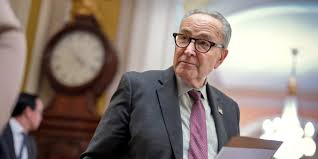A Shutdown Without End: Inside Washington’s Brewing Crisis
Something unusual is brewing in Washington — and it’s not just the usual partisan theater.
As the government shutdown drags into its second month, the nation’s capital feels less like a seat of power and more like a pressure cooker. Hallway tempers are flaring, inboxes are overflowing, and behind closed doors, frustration is starting to boil over.
Every day the standoff drags on, federal workers go without pay, agencies slip deeper into dysfunction, and the American public grows more restless. Yet inside the Capitol, the stalemate holds — and so does the question echoing through every corridor: Is this a real policy battle, or a calculated waiting game?

Deadlock, Again
For the 14th time, Senate Democrats have voted down a Republican-backed plan to reopen the government, stretching the shutdown into its 35th day — now one of the longest in U.S. history.
Standing before reporters on Tuesday, Senate Majority Leader John Thune tried to project calm. “I hope we’re close,” he said, choosing his words with the weariness of someone who’s repeated them too often. “But the pressures are high, and everyone’s feeling it.”
Thune didn’t sugarcoat the damage: “This has gone on far too long. The American people have suffered enough — it’s time to bring this to an end.” Yet he added what’s become Washington’s most familiar refrain: the votes just aren’t there.
Republicans, Thune argued, have “shown flexibility” on appropriations, health-care adjustments, and stopgap funding, while Democrats continue to “move the goalposts.” The scope of negotiation, he insisted, is “already clearly defined.” The real question, he said, is “whether Democrats will take yes for an answer.”
Running Out of Time
Despite the impasse, Thune hinted that “some progress” could emerge this week — a faint light in an increasingly narrow tunnel. Talks are underway to finalize an appropriations deal that could pave the way for a continuing resolution, temporarily restoring government operations.
But the clock is merciless. The November deadline looms, and patience is evaporating.
Across the Capitol, House Speaker Mike Johnson signaled his readiness to reconvene for a vote if the Senate can pass a bipartisan compromise. Still, he drew his own red line: “I think putting funding into January makes sense,” Johnson said. “Nobody wants another Christmas Eve omnibus disaster.”
In other words, the holiday miracle Congress usually prays for may not come this year.
Cracks Within the Chamber
Not everyone is pessimistic. Senator Markwayne Mullin (R-OK) predicted a breakthrough “by Thursday or Friday,” even as he accused Democratic leadership of orchestrating the impasse for political optics. Behind the scenes, he claimed, “several Democrats are ready to cross the aisle — they’re just waiting for permission.”
The optimism feels thin. With each failed vote, the Senate’s 60-vote threshold becomes less a rule and more a wall — one that neither side seems willing to scale or dismantle.
Enter Trump, Again
From the sidelines, former President Donald Trump has reemerged as a vocal instigator, urging Republicans to “go nuclear” — a reference to ending the filibuster and passing funding legislation with a simple majority.
He accused Democrats of “using the shutdown as ransom” to force through $1.5 trillion in new spending, including what he described as “healthcare benefits for illegal immigrants.” In classic Trumpian style, he dubbed the crisis the “Schumer Shutdown,” calling on the GOP to stand firm “until Democrats crack under pressure.”
But that threat cuts both ways. A prolonged shutdown risks alienating swing voters, jeopardizing both parties’ credibility ahead of the next election cycle.
A Game of Endurance
Thirty-five days in, neither party is blinking. Republicans say Democrats are weaponizing the crisis to expand social spending; Democrats argue the GOP’s austerity push is ideological theater. The result? Millions of Americans caught in the middle — without paychecks, without answers, and without faith in the people running their government.
Washington, once again, has turned governance into a game of endurance. And for now, there are no winners — only a country running on borrowed time.
Conclusion: A Capitol Under Siege
As the shutdown enters its fifth week, the Capitol feels eerily suspended — a city functioning on inertia and caffeine. Negotiations continue behind closed doors, but so does the brinkmanship.
Whether this ends with compromise or collapse remains to be seen. What’s certain is that each passing day chips away at public trust — and deepens the sense that America’s most powerful institutions have mistaken paralysis for principle.
